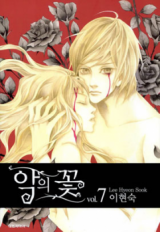Probably one of the more beautiful manga/manwhas I've encountered, definitely the only one to make me tear up. This was my first time reading a story of its kind (incest) and I think it did a good job of displaying the obsessive love the siblings have for one another while still making that love ambiguous. Is it really love, or is it just familial closeness being mistranslated? There are a lot of plot twists that I would NEVER have seen coming, and I was very thankful for the surprises. Shoujo is usually extremely predictable.
The characters were well-defined with personalities that varied vastly from one to the other. The mangaka did a good job of showing how character relationships impacted not only parties involved, but also friends and family and others close by. Every pang of guilt, fear, or physical pain felt by the characters was real and visceral. The technical delivery was stunning (in particular, a scene where the twins' father hangs his head and clutches his glasses stands out) and the art, while often falling flat and becoming nonexpressive, was pretty good as well. Motives were clear, and nothing was confusing about the plot at all. After every reveal I understood exactly what was going on. The only thing that we aren't sure about is
Seh-wa's real feelings. It's never explained whether she is in love with her brother or if it's just platonic love being misinterpreted.
I feel like the ending could have been handled better--specifically,
Seh-wa's death felt jarring and the emotions of the parents, Seh-jun, and Jung were not touched on nearly enough
--but I'm ultimately satisfied with it.
This is really a stunning manga overall, but it is far from a light read and it will push the boundaries of what you're comfortable with, particularly if you have opposite sex siblings. It's not explicit but it can be rather uncomfortable in its lewdest moments. There are a lot of interesting motifs as well, such as Seh-jun's religiousness and
Seh-wa's heart pains
being misinterpreted as "twin telepathy." It also contains a good amount of symbols--Seh-jun's rosary/cross necklace, the twins' framed picture, and near the end, Seh-waand Jung's cell phones. I also found it interesting that Seh-jun being religious and Jung being atheist were deliberately stated early on, and I feel like this was a purposeful move on the mangaka's part to draw attention to the dichotomy and irony of the situation.
! Seh-jun, the religious party, eventually has sex with his sister, tries to kill Jung, and then commits suicide, whereas Jung is tempted to "sin" but holds himself back many times.
However, I could just be looking a bit too far into it.
I highly recommend this manwha if not because you want a realistic (albeit dramatic) story about a romantic relationship between twins then because you should explore these types of situations that can make people uncomfortable. Unsettling, haunting, and beautifully ironic are just some of the words that can be used to describe Flowers of Evil.





